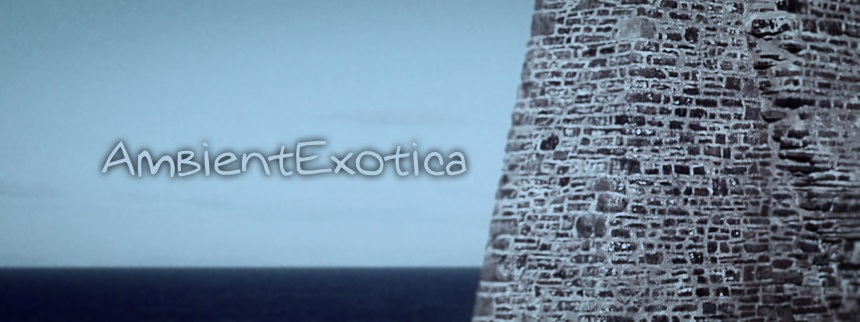
Tim Bass
Pastures
2013
Tim Bass is back with his sophomore album – and fourth work overall – called Pastures, released in May 2013 on Kate Carr’s Flaming Pines label. These news made my day once they reached me, for I consider myself a big fan of the Melburnian’s adamantly fragile guitar-based and synth-underlined Drone tracks which wait for the listener to dive into their beauty rather than enchanting him or her with eclectic patterns right from the start, let alone an abundance of a gazillion textures. Fragility comes with a price, and that is quiescence, for many listeners prefer Ambient music whose virtual stage or panorama is as wide as possible. Thankfully, Tim Bass has improved on this field of knowledge as well. His debut I Have Become Overcome With Thoughts Of You, released in July 2012 on Gavin Catling’s Twice Removed label, was not just my first contact with this label, but a kind of Ambient music I did not fathom out with greater devotion heretofore, so my connection to this artist is thus twofold. He establishes microcosms or places with the help of perfectly carved out sounds and balanced layers, an endeavor which is hard to maintain or even kick off in the first place, for such vignettes are of course reduced in their force, appeal or action; this state can be inverted when the layering technique is enchanting, and rest assured that this is the case on each of Pasture’s five tracks. It needs a patient Ambient listener – no offense intended – who is willed to absorb and soak up the gentle stages and small melodies baked into the soundscapes and field recordings. As Bass himself states in the press blurb, "my goal was to develop stable platforms where texture and movement could form their own natural place. I wanted to move away from creating sound and move towards landscape." As if this articulation was not enough, Tim Bass ameliorates the soils of these landscapes in another specific way: being inspired by French philosopher Michel Foucault’s concept of heterotopia which limns an innermost space where memories of past experiences or missed opportunities are not only mental anymore, but transformed into physical fragments, Pastures has everything a soothing Drone work needs: a profound academic concept, an interdependence of equilibrated layers and a benign, amicable aura… in tandem with a few unexpected protuberances. Read more about the textural and conceptual range below.
Eris opens the album in a truly balmy fashion, washing away any connotations of its link to the eponymous Greek goddess of discord, rather pointing to our solar system where the most massive dwarf planet known to date is orbiting. Its unsurprising name: Eris. Considering the back catalog of Tim Bass as well as his focus on textures that unfold in the humblest possible way, a turmoil of galactic proportions is not what he has in mind. Notwithstanding these assumptions, Eris is different. It feels enormously solemn and encapsulating. Distantly organ-like drones are united with towering auroral strings, the camouflaged guitar fundament with its thick bass runlets swirls quiescently below the sylphlike gestalts of silkened helixes and the gentle allure of fragilely diffuse oscillating glitters. Everything is in peaceful fluxion, the main difference to Tim Bass’ previous offerings being the oxymoronically widened hypocenter; the textural wealth seems larger, the abyssal low frequency drones conflate wondrously with the thinner ingredients, preventing Eris from being perceived as frail and enfeebled. The movement of the melodies resembles spectral serpentines, the tone sequences and halftone occurrences are delicately blurred, but this procedure does not lead to huge billows of reverberation and cavernous depth. The Melburnian only captures the calcined afterglow of their haze. The only additional texture to appear in these surroundings is a circular saw-like guitar riff, but instead of serrating the carefully created cherubim apart, it ennobles the dreamscape with a perceived curiosity. Like insect-oid flaps, these brazen firefly scintillae may inherit slivers of tension, but these do not break free and hence leave the morphogenesis of Eris unperturbed. It is a stellar opener and lets the interdependencies of its frequencies morph and iridesce on different volume levels, like every good Drone artifact does. It is both tranquilizing and majestic, meek enough to not demand attention yet open to scrutiny and available for a dedicated submergence into its river bed of ethereal currents.
Quite in contrast to the positively streamlined complexion of Eris appears the following self-referred Smoke Plume Expanding. It seems less esoteric and more comprehensible thanks to the explanation given in its title, but its gaseous physiognomy proves to be much more progressive, a term I use only reluctantly despite its frequent occurrence at AmbientExotica, for it means multitudinous things to many people, be it an exciting sequence of events or a post-Avantgarde master plan. Thankfully, Tim Bass’ conception is neither. However, this second arrangement is clearly polymorph and aurally depicts the titular phenomenon via a field recording of white water rapids or maybe even an actual smoke plume. Whatever the actual source may be, it resembles a mesmeric gust of pink noise, even a few birds are included. After more than a minute, the synth-accentuated guitar strata take over the scenery, and this change is already more defined and monosemous than the mellow mystique of the opener. Once the guitars are firmly in place, they do not hide their origins but are clearly recognizable as such. One layer feels much more vaulted and resides in the lower frequency ranges while the other’s luminosity emanates golden-orange cavalcades of colors and oftentimes figuratively plinks or even unleashes a piercing sine tone which risks the danger of disturbing the well-crafted balance, but soon enough returns to its complemental state a few moments later. Smoke Plume Expanding expands before the inner eye, and when this unfurling scheme takes place, the smoke plume grows stronger and gains more layers before it vanishes, draped in tape hiss. It is Idle Thoughts Gravitate Towards Loneliness which feels less aeriform than acroamatic. However, a positive, designedly reduced euphoria still finds its prominent place and moulds the potentially threnodic title into a capsule of bliss. Right during the fade-in phase, a strong ecclesiastic timbre is enforced, and in-between the micro-fissures of halftones, the couple of euphony and rapture is in unity. Distant hisses interpolate the wideness. Carefully placed guitar riffs emerge from the sedately unhurried fluidness… are these the idle thoughts, or better still, flashes of genius? Whatever triggers their escapism from the genteel warmth, they feel like sparks on top of an epicurean draft.
Up next is the quirkily titled Stutter, for this is in fact a perfect legato Drone track: no stammers, shrapnel or staccato disturb the placidity of it. A mindful listener might spot the strongest luminescence of the whole album in this arrangement of layers. And indeed, Stutter is awash with light, but this figurative light does not reach the ears of the listener in its pristine state, but is filtered, curiously granular, nonetheless translucent. Whereas its opening phase could be conceived as mildly eerie due to a few shadier, portentous guitar chords, this state is then completely annihilated. Deep bass drones accentuate the most quiet layer intertwinement, the light resides in a mercurial spectrum, ranging from ashen over gunmetal to warmer hues. It is during the last minute that the electric guitar coatings grow larger, inject vigor and lachrymosity into the diorama. Even though light is all over it, I consider Stutter the weakest part of Pastures, a status that is not as baneful as one might think. Strangely enough, this particular vignette feels rushed, uneasy and tense; given the album’s endemic overarching buildup of peacefulness and calm, this assertion feels de trop, but justifiable in the end. The cohesion and unison of the layers does not seem to work as saliently as on the other tracks, the guitars are too quiet, and once they prosper, the tones are too doleful and all too incisive. Everything else shines: the hazy alloy, the dazzling light as well as the bass streams. The final track is called Onward From Nowhere and breaks the self-imposed boundaries for good. What was hinted at in Stutter – vesicles of premonition and movement – is downright unchained here. Onward From Nowhere is Tim Bass’ storm-and-stress contribution, his most energetic and eclectic track to date. Featuring a field recording of a rattling train with adjacent seagulls nearby, this short nod to Chris Watson’s El Tren Fantasma (2011) is then transfigured with a countermeasure of perfectly melancholic and unhurried guitar drones of golden colors. The clash of these entities, the concomitance of fulminant-vital train rides and pondering-retrogressive trains of thoughts (!) is a successful experiment which could have gone awfully wrong, but is skillfully presented. The lacunar structure, the many fissures and cracks in the appearance are covered by the positively stolid guitar concoctions. An eminently dichotomous closer.
Pastures is a wonderful sophomore album by Tim Bass and delivers exactly what I expected from the talented guitarist and producer, namely those fragile entities of depth and suspended contentment which prove to be so wonderfully augmenting and expanding during my desk work. While this purposeful ricketiness is ubiquitously in place and always featured, even when its omnipresence is only looming and anything more but a scent, Tim Bass grafts deeper frequencies and a greater wideness onto these base frames. Especially tracks like Eris and Idle Thoughts Gravitate Towards Loneliness unite their thinned constructions and coruscating coils with synthetic ornaments and electric guitar caverns, resulting in a next to perfect balance of drone layers supercharged with potentially conflictive but essentially collaborating elements. The usage of field recordings is another bold step forward, eventually leading to the most exciting and dynamic track of Tim Bass, the train ride on Onward From Nowhere which takes concepts like progression or movement to truthful, literal depictions of traveling. It is hence breaking the Drone-based scenery of melancholia and retrospection despite the reliance of the nostalgia layering technique as envisioned via the snugly guitar aorta. Indeed, Onward From Nowhere is the showstopper here in terms of dynamics and adventure, and whether that is good news or not depends on the listener. I for one embrace the sense of freedom, wideness and the enormously dualistic throe of the discordant, antagonistic layers in this closing track, but this evocative finale is undoubtedly a denial of the heretofore established drone washes, a contrariety to the nullity of contemplation and a dissent regarding the pith of pensive thoughts. Every one of these concepts is instantly triggered in all of these tracks though. In this regard, Kate Carr’s press blurb about Pastures is very poignant: "It is an album which rather than demanding your attention, patiently waits for you to notice just how special it is." If the listener is keen on the interplay of textures, cautionary hints or inklings of halftone melodies, Pastures is a gorgeous gem, less cinematic than balanced and quiet, seemingly strolling along in an alatoric fashion, deliberately desiccated in its voluminosity, but incredibly insouciant.
Further listening and reading:
- You can listen to track 2, Stutter, on SoundCloud.
- More information is available at the Flaming Pines website.
- Follow Flaming Pines on Twitter: @FlamingPines.
Ambient Review 223: Tim Bass – Pastures (2013). Originally published on May 29, 2013 at AmbientExotica.com.
